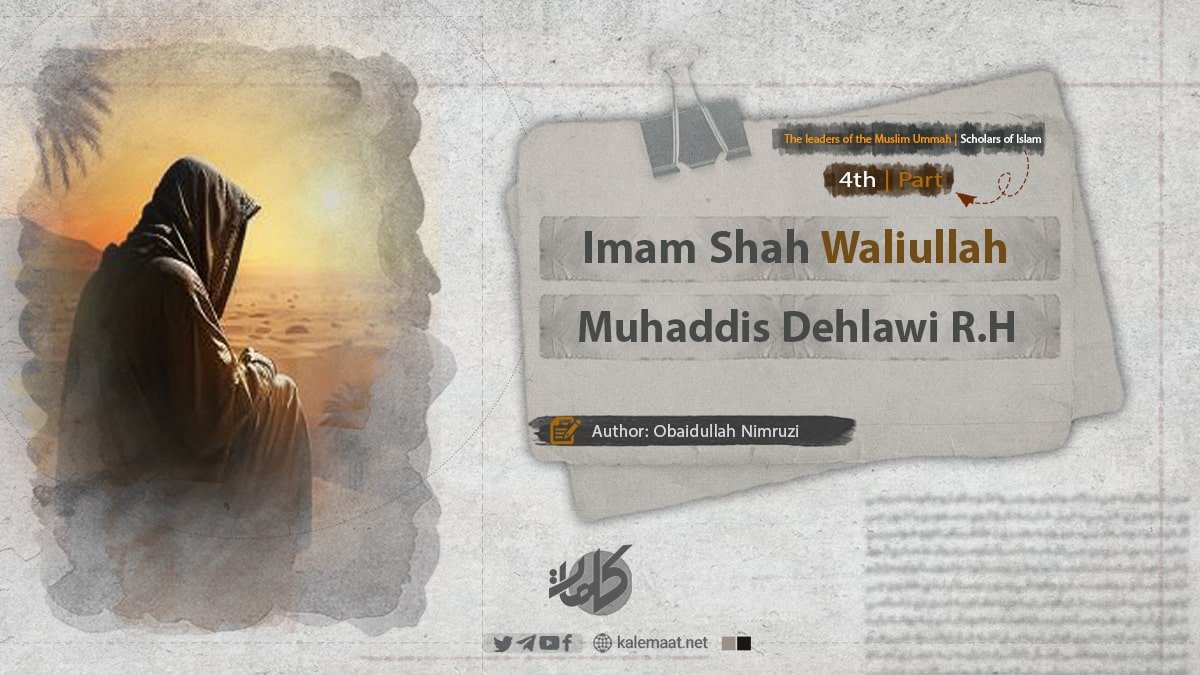
Author: Obaidullah Nimruzi
Imam Shah Waliullah Muhaddis Dehlawi “R.H” (Part 4)
Influential Thinkers and Trends
Muslim modernists, such as Allama Muhammad Iqbal Lahori in 1938 and Fazlur Rahman in 1988, saw in him a unifying figure amidst divisions and factions, jurisprudential-legal and ideological sectarianism. This inspired a call for new ijtihad and a return to the essence of the Quran and Sunnah. He authored a concise autobiography (in Farsi) titled “Al-Jawz al-Latif fi Tarjamat al-‘Abd al-Za’if,” and references to his biography can be found in the book “Infas al-Arifin.” The cultural and socio-political movement initiated by him, his children (particularly Abdul Aziz among his five sons), and his students came to be known as the “Wali Allah Movement,” as interpreted by Obaidullah Sindhi in 1944.
After the establishment of Pakistan and its independence, Allamah Shah Waliullah was considered as a national hero and socio-political thinker, and he was given the same status as the 17th century Indian Muslim mystic and religion-social reformer (Sheikh Ahmad Sarhandi).
Today, as mentioned, the major Islamic religious movements in South Asia (Deobandiyya) consider themselves inspired by the opinions and works of Shah Waliullah and his son Shah Abdul Aziz, and movements such as Ahl al-Hadith; Even the followers of Maulana Maududi, in the life and works of Shah Waliullah, find a return to the main principles of Sharia, political rejection, foreign cultural-colonial influence and in a word, the source of their reformist beliefs.
Shah Waliullah Muhaddis Dehlawi, R.H, in the speech of scholars
Undoubtedly, the scientific, jurisprudential and political position of Shah Waliullah Dehlawi, may Allah have mercy on him, has not been hidden from any of his contemporary scholars and also after him, many scholars and thinkers have written about him and his reform services.
His sheikh, Abu Taher Muhammad bin Ibrahim Al-Kurdi Al-Madani, said: “He used to transmit the wording from me, and I used to correct the meaning from him.”
The teacher of Shah Waliullah, may Allah have mercy on him, Sheikh Abu Tahir Kurdi, may Allah have mercy on him, says about him: “Shah Waliullah Dehlawi narrated the hadith from me, and I corrected the meaning with his help.”
Mirza Mazharjan-e Janan says about him: “Sheikh Waliullah has a special and unique style in researching mystical issues and the complexities of other sciences. He is one of the divine scholars who can be said to be one of the few who has combined the external and internal science. And like him, there are fewer among the Sufis.”
Allamah Fazl Haq Khairabadi writes: “Sheikh Waliullah Dehlawi, may Allah have mercy on him, is an endless sea whose shore cannot be seen.”
Mufti Inayat Ahmed Kakuri says about him: “Shah Waliullah Dehlawi is a family tree of goodness, the root of which is in his house and its branch is in the house of every Muslim, and there is no house that does not have a branch of this family tree in it; But the people [who benefit from it] donnot know where its origin is.”
Syed Suleiman Nadvi, may Allah have mercy on him, says: “Serving correct knowledge is actually another form of divine remembrance that gives confidence to the heart and peace of the soul. If we examine the several thousand-page writings of Shah Waliullah, we will never feel that these books were written in the 10th century, when seditions, wars, and riots were everywhere; Rather, you will find a sea of knowledge and grace that flows with complete peace and certainty, far from any chaos and without any influence of time and place.
Sheikh Mohammad Bashir Sialkoti says: “Shah Waliullah Dehlawi was the imam of the sciences of narration, reason and language, he was a sign of Allah’s signs in his intelligence, purity of soul, gentleness of feeling and high effort, people considered him as a divine scholar, a social thinker and a mentor. They were known as wise and intelligent, and they looked to him for a solution in big problems and important events.
Continues…



